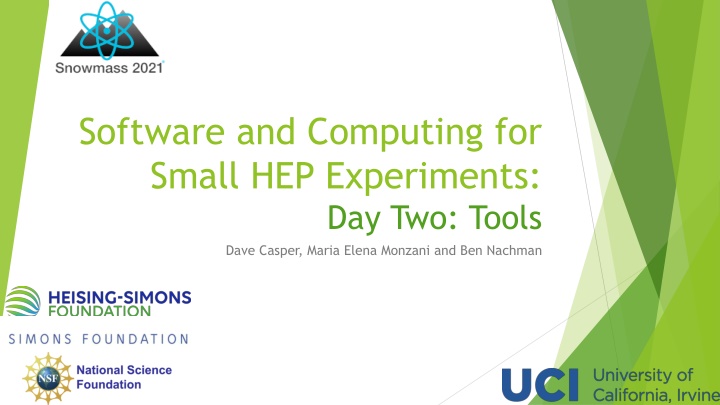
Software and Computing Tools for Small HEP Experiments
Explore the tools and challenges faced by small HEP experiments in software and computing, covering event generation, detector simulation, reconstruction, and analysis. Join the workshop to learn more about trends in hardware resources and different tools utilized.
Download Presentation

Please find below an Image/Link to download the presentation.
The content on the website is provided AS IS for your information and personal use only. It may not be sold, licensed, or shared on other websites without obtaining consent from the author. If you encounter any issues during the download, it is possible that the publisher has removed the file from their server.
You are allowed to download the files provided on this website for personal or commercial use, subject to the condition that they are used lawfully. All files are the property of their respective owners.
The content on the website is provided AS IS for your information and personal use only. It may not be sold, licensed, or shared on other websites without obtaining consent from the author.
E N D
Presentation Transcript
Software and Computing for Small HEP Experiments: Day Two: Tools Dave Casper, Maria Elena Monzani and Ben Nachman
Todays focus: Tools Yesterday s session surveyed a representative set of six different small HEP experiments, highlighting their software and computing challenges and solutions. Today we project the subject of the Workshop onto a different axis, aiming to survey a representative set of the tools used by small HEP experiments Attempt to cover the major software domains - event generation, detector simulation, reconstruction, analysis as well as trends in hardware resources Tension between survey of many tools in a given area and a more complete examination of a single tool there are talks of both types today. Clearly impossible to be all-inclusive, so apologies if your favorite tool isn t included!
Todays agenda Note we have one more talk today than yesterday, so the schedule calls for 15-minute talks with 5 minutes for discussion.
Resources Suggestion: right-click your name in Zoom and rename yourself to include your experimental or other affiliation Indico page: https://indico.physics.lbl.gov/event/1756/ Zoom link (with password): https://lbnl.zoom.us/j/92878606686?pwd=N1Z4YXdKWFNDR0JORUx6dTNETnJJQT09 Live notes: https://docs.google.com/document/d/1EbbWwjGF2YAcZIRyau018Rr8_VKVz1CdLOP8KKYY1SA/edit
